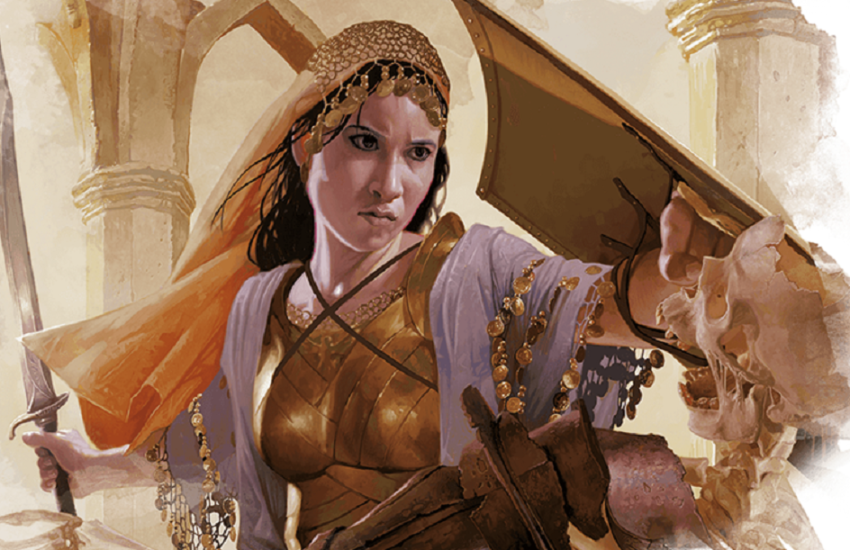Disclosure: A link at the bottom of this article is an affiliate link, meaning, at no additional cost to you, I will earn a commission if you click through and make a purchase.
My party recently came up against some werewolves that had taken over a town.
Naturally, the thought of silvering their non-magical weapons came to minds, and so I had to do a bit of a deep dive into what exactly it means to have a silvered weapon in D&D 5e.
The pursuit of this knowledge came from this awkwardly worded sentence in the Werewolf’s damage immunities: “[Immune to] Bludgeoning, Piercing, and Slashing From Nonmagical Attacks Not Made With Silvered Weapons.”
You can probably understand where the confusion comes from. Basically, this means that werewolves are immune to any attacks made by non magical, non-silvered weapons, meaning that magical weapons, silvered weapons, and magical silvered weapons will all bypass the immunity.
“Does this mean that silvered weapons are magical?” one of my newer players asked. “Hell no,” I said, though I realized I should probably look it all up just to be certain.
Here the Rules as Written as far as silvering weapons goes:
“Some Monsters that have immunity or Resistance to nonmagical Weapons are susceptible to silver Weapons, so cautious adventurers invest extra coin to plate their Weapons with silver. You can silver a single weapon or ten pieces of Ammunition for 100 gp. This cost represents not only the price of the silver, but the time and Expertise needed to add silver to the weapon without making it less effective.”
Got a few hundred gold pieces you’re not spending after looting a dungeon? Why not head down to the local blacksmith and upgrade your party’s main weapons, just in case.
Unfortunately, there are no official D&D 5e monsters that are vulnerable to silver (no matter what your head canon may be when it comes to werewolves and vampires); silvered weapons simply offer a way to bypass resistances and immunities, if applicable.
Here’s a list of all the Monster Manual creatures that are affected by silver:
Resistant to non-magical attacks that aren’t silvered:
- Barbed Devils
- Bearded Devils
- Bone Devils
- Chain Devils
- Erinyes
- Horned Devils
- Ice Devils
- Imps
- Pit Fiends
- Spined Devils
- Wights
- Wraiths
- Night hags
Immune to non-magical attacks that aren’t silvered:
- Werebears
- Wereboars
- Werebats
- Weretigers
- Werewolfs
- Jackalweres
Now, the issue that usually arises is that there are plenty more monsters that are simply immune or resistant to non-magical weapons, period.
Because the stat blocks of those monsters do not include the addition: “…that are not silvered,” it means that non-magical silver weapons don’t do anything special against them, because you’re basically just swinging a flashy non-magical sword.
Of course, silvered weapons can become magical weapons, but that will take some extra tinkering on the part of your friendly neighborhood Artificer, or by some other means.
You won’t find a monster that’s affected by silver who isn’t affected by magical weapons, though, so the general rule of thumbs is that if your silvered weapons bypass the monster’s resistance, so too will your magical weapons. The same is not true vice-versa, ie. just because a magical weapon bypasses resistances, it doesn’t mean that a silvered weapon will.
Special note: The fact that a weapon is silvered does not have any affect on Vampires in D&D 5e. If you hit a vampire with a silvered weapon, it will do half damage as would all other non-magical weapons, due to their resistance.
To add to the confusion, the Githyanki section of the Monster Manual has information about their own silvered swords: “In ancient times, gith knights created special weapons to combat their mind flayer masters. These silver swords channel the force of the wielder’s will, dealing psychic as well as physical damage. A githyanki can’t become a knight until it masters the singular discipline needed to will such a blade into existence. A silver sword is equivalent to a greatsword, and takes on the properties of a +3 greatsword in the hands of its creator.
In the eyes of the githyanki, each silver sword is a priceless relic and a work of art. Githyanki knights will hunt down and destroy any non-githyanki that dares to carry or wield a silver sword, reclaiming it for their people.”
So yeah, you might come into some issues with Githyanki if they find you with any sort of silvered weapons.
(and no, taking a Githyanki’s silver sword will not give you a +3 magical silver sword, due to the “…in the hands of its creator” clause.)
Interestingly enough, Mind Flayers don’t actually have any damage resistances or immunities anyway, so an ordinary silver weapon hits them just the same as a non-silvered non-magical weapon. Maybe the Githyanki were just being extra.
And as for where parties can get their weapons silvered, DMs should use their discretion. I highly doubt that many small-town blacksmiths have the material or the know-how for a 100gp job, but the likelihood obviously goes up depending on how often adventurers come through. My advice? If it makes the game more fun for your players, go for it.
Interested in the nitty-gritty of RAW and RAI? Pick up a Dungeon Master’s Guide to delve into the inner workings of D&D 5e.
Info via:
Inspiration from Reddit threads:
- Are Silvered Weapons considered Magic?
- Silvering weapons?
- Silvered weapons and monster vulnerability…

